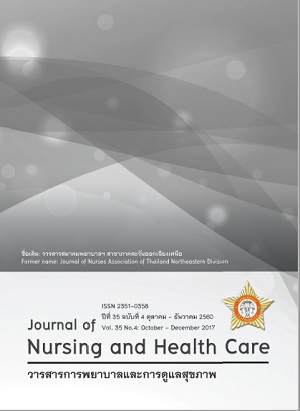ปัญหาในการดูแลภาวะหัวใจหยุดเต้นในห้องผ่าตัดของพยาบาลห้องผ่าตัด Problems of Cardiac Arrest Management in Operating Room among Operating Room Nurses
คำสำคัญ:
การช่วยชีวิต พยาบาลห้องผ่าตัด ภาวะหัวใจหยุดเต้น, cardiac arrest, operating room nurse, resuscitationบทคัดย่อ
ห้องผ่าตัดเป็นสถานที่ที่ผู้ป่วยมีโอกาสเกิดภาวะหัวใจหยุดเต้นสูง เนื่องจากผู้ป่วยที่มารับการผ่าตัดมีความเสี่ยงทั้งจากการวางยาระงับความรู้สึก การผ่าตัด และโรคประจำตัวของผู้ป่วย ดังนั้นพยาบาลห้องผ่าตัดจึงควรมีความสามารถในการดูแลผู้ป่วยที่มีภาวะหัวใจหยุดเต้น การศึกษานี้เป็นการศึกษาเชิงพรรณนาที่มีวัตถุประสงค์เพื่อศึกษาปัญหาที่เกิดขึ้นในกระบวนการดูแลผู้ป่วยที่มีภาวะหัวใจหยุดเต้นของพยาบาลห้องผ่าตัดเพื่อนำข้อมูลไปใช้พัฒนาความสามารถของพยาบาลห้องผ่าตัด โดยกลุ่มตัวอย่างเป็นพยาบาลห้องผ่าตัด โรงพยาบาลศรีนครินทร์ มหาวิทยาลัยขอนแก่น ที่ปฏิบัติงานในห้องผ่าตัดอย่างน้อย 6 เดือน จำนวน 113 คน ได้รับแบบสอบถามเกี่ยวกับข้อมูลทั่วไป การฝึกอบรม ประสบการณ์การช่วยชีวิต อุปสรรคในด้านความรู้ในการช่วยชีวิต การประเมินผู้ป่วย การตามทีมช่วยเหลือ การช็อกหัวใจด้วยไฟฟ้าแบบอัตโนมัติ และความมั่นใจในการช่วยชีวิต) รวมทั้งระบุสาเหตุของปัญหา โดยได้รับแบบสอบถามกลับร้อยละ 64.6 ผลการศึกษาพบว่าเป็นเพศหญิงทุกคน และมีอายุเฉลี่ย 35 ปี ปัญหาที่พบมากที่สุด คือ การตามทีมช่วยเหลือ รองลงมาคือความมั่นใจในการช่วยชีวิต ความรู้ในการช่วยชีวิต การประเมินผู้ป่วย และการใช้เครื่องช็อกหัวใจด้วยไฟฟ้าแบบอัตโนมัติ ตามลำดับ โดยปัจจัยที่เกี่ยวข้องคือ การจดจำขั้นตอนการช่วยชีวิตไม่ได้ การทบทวนไม่เพียงพอ ขาดการฝึกปฏิบัติในสถานการณ์จำลอง และขาดการประชาสัมพันธ์แนวทางปฏิบัติอย่างทั่วถึง สรุปได้ว่าปัญหาต่อการช่วยชีวิตของพยาบาลห้องผ่าตัดในการดูแลผู้ป่วยที่มีภาวะหัวใจหยุดเต้นมีค่อนข้างสูงในทุกด้าน จึงมีความจำเป็นในการสร้างรูปแบบการพัฒนาความรู้ความสามารถของพยาบาลห้องผ่าตัดโดยการจัดให้มีการทบทวนความรู้และทักษะอย่างสม่ำเสมอและควรมีการฝึกในสถานการณ์จำลองตามสภาพงานจริง
An operating room is a high-risk place for cardiac arrest because patients have anesthesia risks, operative risks, and patient’s underlying diseases. Thus, operating room nurses should have been competent for cardiac arrest management. This prospective descriptive study aims to study problem’s operating room nurse during cardiac arrest management in the operating room. This study included 113 operating room nurses who worked at Srinagarind Hospital (Faculty of Medicine, Khon Kaen University, Thailand) at least 6 months into the study. All operating room nurses received the specially designed questionnaire which included demographic data, life support training, life support experience, their limitations in life support knowledge, patient evaluation, response team notification, use of automated external defibrillator, and confidence in patient care included their reasons. The response rate was 64.6 %. All participants were female and the average age was 35 years old. The findings were that notification the cardiac arrest team was rated as the most common problem. Other problems were confidence in patient care, life support knowledge, patient assessment, and the use of automated external defibrillator, respectively. Associated factors were forgetting step of life support procedure, insufficient knowledge refreshment, lack of experience in simulation, insufficient guideline circulation. In conclusion, there are many problems in cardiac arrest management among the operating room nurses. Thus, it is necessary to equip the operating room nurses for life support knowledge and skills competence. Our suggestion is to provide frequent knowledge and skill refreshment and in situ simulation training.



